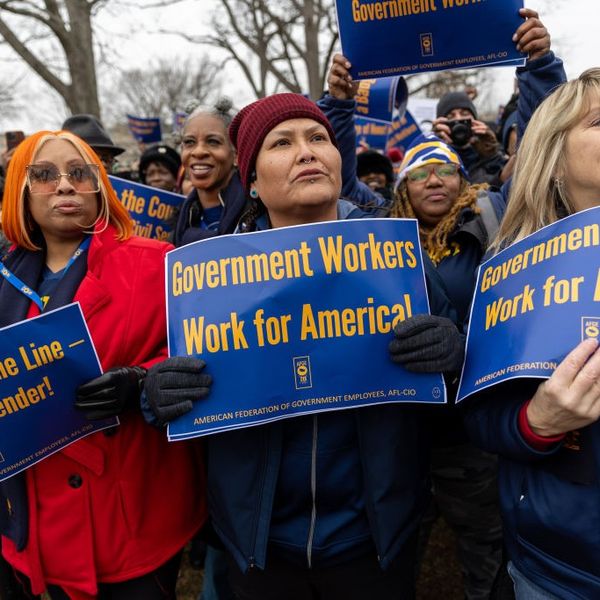A year ago, when Wisconsin Governor Scott Walker signed into law his plan to undermine collective bargaining rights for state, county and municipal employees and public school teachers, the prediction from the governor and his allies was that the mass movement to oppose Walker's anti-labor agenda would fade.
The governor and his allies were wrong.
As the state prepares for a recall election that could remove Walker from the governorship--along with his lieutenant governor and four Republican state senators--tens of thousands of union activists and their supporters rallied once more Saturday at the state Capitol in Madison.
It was an epic turnout, estimated by Governor Walker's Department of Administration at 35,000 and by organizers at closer to 60,000.
Whatever the actual number, there was no question that the crowd filling the great square around the Capiol was the largest to gather since the mass mobilizations of February and March, 2011. The protests of last year drew the attention of the nation--and the world--and helped to encourage pushbacks against anti-labor legislation in Ohio, Michigan, Florida, Arizona and other states. They featured an ongoing peaceful occupation of the state Capitol that served as one of many inspirations for the Occupy Wall Street movement.
The resilience of the Wisconsin movement has few precedents in recent American labor history.
"They didn't think we could sustain it," said Wisconsin AFL-CIO President Phil Neuenfeldt. "Not only have we sustained it. We've gotten stronger."
Neuenfeldt was referring to the movement that submitted more than one million signatures to recall Governor Walker (46 percent of the electorate in the last gubernatorial election), 840,000 signatures to recall Lieutenant Governor Rebecca Kleefisch and another 100,000 signatures to recall key Republican senators.
"Look at what a difference a year makes," declared Mary Kay Henry, the president of the Service Employees International Union, who marveled at the size of Saturday's crowd of union members, farmers, small business owners, students and retirees that surrounded the Capitol. "Governor Walker and the Koch Brothers started something last year, but they're not going to like how it ends. When it ends there is going to be a pro-middle class governor and lieutenant governor--and a pro-worker majority in the Senate."
What Walker started was an assault on more than fifty years of commitment by Wisconsin leaders, Democrats and Republicans, to protect the rights of workers and their unions.
On Saturday, as tens of thousands of Wisconsinites marched in remembrance of the uprising against Walker's agenda, there was much talk about the upcoming recall election -- and that was important.
But it was equally important that the issue focus remained on renewing the state's collective bargaining law. There was a recognition that the Wisconsin fight has never been, and can never be, about partisan politics alone. Not when basic rights are at stake.
Collective bargaining is a part of Wisconsin history, an example of this state's "forward" progressive values.
"I was around in 1959 when Wisconsin became the first state in the United States, the first state in the Union, to adopt a law to permit public employees to collectively bargain," explains the senior member of the state Legislature, Senator Fred Risser, D-Madison. "Back then, Wisconsin was known as a progressive, innovative state."
Risser's serious about renewing Wisconsin's reputation as a progressive, innovative state, And he has joined with a much younger legislator, state Representative Mark Pocan, D-Madison, to propose legislation that would fully restore collective bargaining rights in Wisconsin.
Pocan says this is a first-order-of-business necessity.
"For half a century, we have had good working conditions with our employees because of the collective bargaining law," explains Pocan.
Governor Walker's attacks on collective bargaining rights have created chaos, dissension and a sense of crisis that has stalled innovation and economic growth in Wisconsin.
Saturday's rally served as a reminder that there is broad recognition among Wisconsinites that restoring collective bargaining rights is the place to begin renewing a tradition of cooperation, efficiency and good government to a state that has long recognized that labor rights are human rights.



